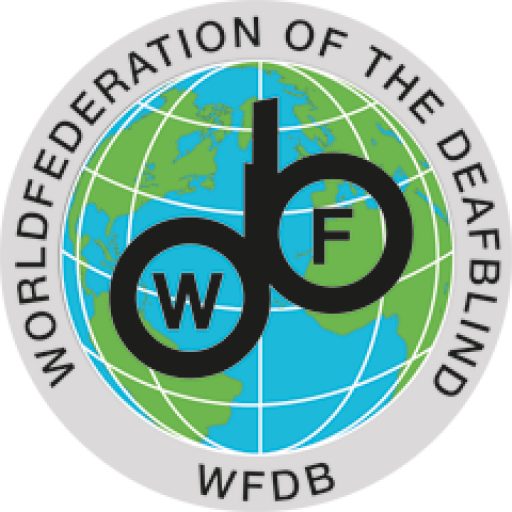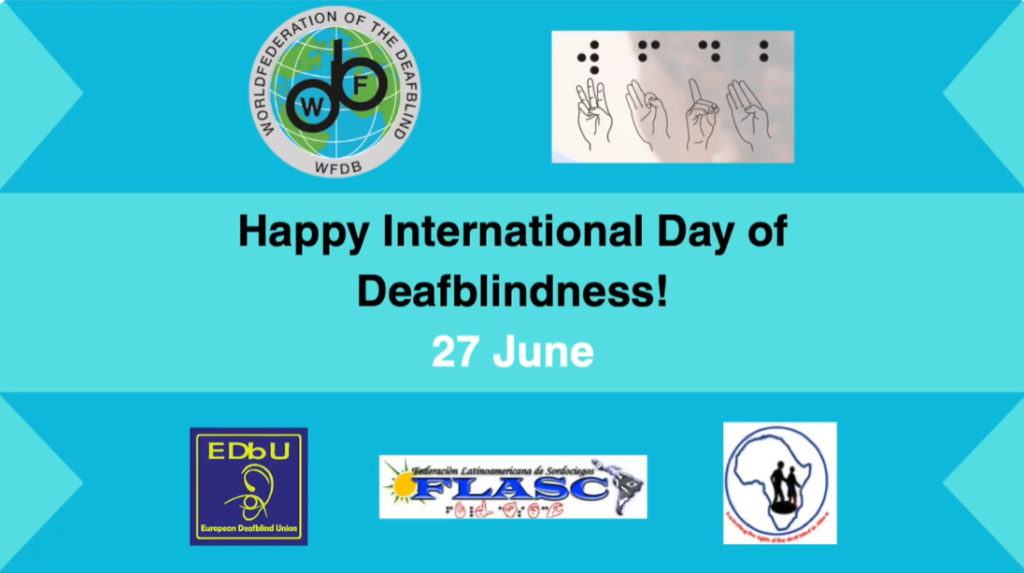Today, June 27, marks the International Day of Deafblindness, and we want to share the voices of persons with deafblindness from around the world. As an organization for and by persons with deafblindness, one of our core missions is to represent the true voice of the deafblind community.
This year, we are celebrating the United Nations’ official recognition of this important day, and of deafblindness as a distinct disability, through a historic resolution. In the video above, person with deafblindness from around the world greet viewers with “Happy International Day of Deafblindness” in their native languages and preferred communication methods.
Moreover, to honor this milestone, we asked persons with deafblindness what this recognition means to them and how they believe it will impact the global deafblind community. Below, we are sharing some testimonials. Thank you to all who shared their thoughts with us:
“As a deafblind person from Latin America and a representative of deafblindness in Uruguay, the adoption of this resolution is extremely important to me, as it will bring visibility to our disability and provide international support from various perspectives that affect our lives. The inclusion of persons with disabilities in decision-making spaces is essential (…) — not only thinking of disability today but also laying a strong foundation for the future.”
— Enrique Ramirez, Uruguay
“I feel that, with this resolution, we finally have a new harbor. For the first time in history, the WFDB ship can dock in an official and safe place. This harbor represents a space of recognition and visibility. From here, we can begin to build real infrastructure: relationships, accessibility, legislation, and quality of life for deafblind people. (…) This International Day not only honors the struggles and achievements of deafblind individuals, but also opens the door to greater inclusion, respect, and commitment from governments, institutions, and society. The impact can truly be transformative: more access to resources, education, assistive technology, and public policies that genuinely respond to our realities.”
— Pere Canteys, Spain
“By recognizing and establishing the International Day of Deafblindness, the UN has taken a fundamental step toward a more just and inclusive world. It is a commitment to the dignity, equality, and full participation of deafblind individuals, reaffirming that their voices must be heard and their rights guaranteed in all areas of life.”
— Board of Directors of FASOCIDE (Federation of Associations of Deafblind People of Spain)
“The UN’s resolution to observe Deafblind International Day is a landmark step toward global recognition of a community often marginalized due to dual sensory disabilities. In Malawi, where deafblind needs are rarely prioritized, this will catalyze local adaptations, like training guides for persons with deafblindness or braille-tactile materials in schools. Globally, it strengthens solidarity under the CRPD.”
— Ezekiel Kumweda, Malawi
“I felt goosebumps as I took part in the UN’s virtual session last week, and now we are witnessing a global milestone: the very first International Day of Deafblindness! Around the world, people who are deafblindness, allies, service providers, and family members have been working hard to raise awareness and push for meaningful change. It’s time for our voices to be heard, and for us all to help unlock the full potential of persons with dual sensory disabilities.”
— Sricamalan Pathmanathan, Canada
“The UN declaration means that millions of people know that deafblindness is a unique disability and it needs to be understood and the people given the support they need to exercise their right to be a contributing member of their country or within the world if that is their desire. The UN declaration of June 27 be international deafblind awareness day means more people will learn about our disability and the ability we have, given we receive the necessary profesional person to assist us (…) My expectation is that each country will give this group of deafblind people more attention and provide the way for us to have the rights we deserve (…)”
— Penny Leclair, Canada
“The ratification of the International Day of Deafblindness will bring a much-needed spotlight to this low-incidence population. This will make policymaking more effective for the Deafblind community.”
— Christopher Woodfill, USA
“This is not a randomly selected date — it is a meaningful day, as it marks the birthday of Helen Keller, one of the most influential figures in the history of deafblind advocacy. Her legacy stands for resilience, education, and human rights worldwide — and all of this as a person who was Deafblind herself. We want to carry forward the efforts for which she paved the way, and this recognition is a milestone in that direction. (…) This initiative is not just about acknowledging the rights of the Deafblind community — not “just” another UN day added to the calendar — it is about ensuring that future generations of Deafblind youth grow up in a more just and inclusive world.
— Sanja Tarczay, Croatia
“In many countries, blind and deaf people are recognized — but not deafblind people. With the UN’s recognition, the local and international deafblind community now has a strong argument for why deafblind individuals should be identified as a distinct group with specific characteristics. For example, tactile sign language is still not widely recognized, even though it is mentioned in the UN CRPD.”
— Riku Virtanen, Finland
“Finally, it has been officially adopted – a truly significant day and a wonderful month for all of us. Every small step and every form of recognition is precious. The more visibility this cause receives, the more awareness will grow in society. This resolution will create an important ripple effect – from one person to the next, from one organization to another. In the long term, it will help ensure that the rights and needs of deafblind people are seen and respected. I am sincerely grateful to WFDB and the Croatian authorities for their commitment. It makes this long journey a little bit lighter and gives us more hope for the future.”
— Til Apfel, Germany
“This resolution is a big victory for us. We are no longer invisible. It will help open doors for the rights of persons with deafblindness in Nepal.”
— Krishnamaya Adhikari, Nepal
“This recognition is more than a date — it is a symbol of identity for persons with deafblindness. For too long, without formal recognition, we lived in the shadows — advocating with limited tools, often questioned: “Who are you?” and “What are you?” We were too often misclassified under either the blind or the deaf, and as a result, services were misallocated, underestimated, or simply denied. But now — we can speak up boldly, demanding tailored services for a unique and distinct community: persons with deafblindness.”
— Juliet Wabukawo, Uganda
“We have taken a very important step toward the recognition of deafblindness as a unique disability — and, more importantly, in influencing States not to leave anyone behind, placing strong emphasis on actions aimed at the comprehensive care of persons with this disability. At the same time, by declaring June 27 as the International Day of Deafblindness, we bring visibility to the full scope of what persons with deafblindness are capable of — in employment, culture, sports, and all areas of personal development.”
— Yamilia Guillén Rodríguez, Cuba
“We feel dignified and fulfilled by this achievement, because all disabilities have their day of commemoration — and we were the only ones missing, not yet heard by this international organization (The United Nations) that works day and night to support different communities around the world and to address or solve their challenges. We thank the WFDB, the UN, and all national and international institutions for joining these struggles that we truly and respectfully deserve.”
— Miriam Torres, Venezuela
“I am a person with deafblindness, and I feel deeply proud of my identity. I have no fear or worry, because I recognize myself in the world—true to the principles and history we have built as a community. Today, I feel even more confident and empowered thanks to the UN General Assembly’s decision to declare June 27 as the International Day of Deafblindness. This recognition is a source of pride for me and for all deafblind people around the world. I know this step will have a significant impact and will help break down many of the barriers we still face.”
— Samuel Valencia, Colombia
“Were already celebrating Deafblindness Day… BUT now, with international recognition, being able to say that it is a date validated by the UN gives much more credibility and strength to the celebrations, having a very positive impact.
—Eulália Alves Cordeiro, Brazil
“I know that the resolution will have a positive impact on the deafblind community by creating a greater commitment from states to ensure the fulfillment of the rights of persons with deafblindness — through the development of public policies and the necessary adjustments to build an accessible society, where deafblind people can achieve the social and labor inclusion we all deserve!”
— Melba Benjamín, Dominican Republic
“This achievement greatly contributes to making our existence visible to the world — our identity as a unique disability with its own characteristics. It will help us gradually continue integrating into the active machinery of global society. With this, we begin to walk with more confidence and firmer steps, continuing to demand our rights while also acknowledging our responsibilities in an increasingly demanding society. If society recognizes our existence, we will be able to give even more of ourselves to that society. For me, this recognition, which has been fought for many years and is now being realized, is a step toward equal opportunities for future generations. There is still a long way to go, but this is a definitive step for us and our integration into the world.”
— Sonnia Margarita, Ecuador
“For me, the UN General Assembly resolution means that the deafblind community now has its own official international day on the UN calendar, on an equal footing with the deaf and blind communities.
International Day of Deafblindness June 27 will contribute to publicity and awareness of deafblindness as a separate disability, different from blindness and deafness, in which it is difficult for impaired senses to compensate for each other. The resolution will contribute to the recognition of deafblindness by governments, separately in laws, policies and programs, all UN Member States, organizations and civil society will raise awareness and promote the inclusion of deafblind people, will emphasize the exceptional importance of professional interpreters and interpreter-guides for the deafblind for access to communication and information, as well as the affirmation of the red and white cane as a means of mobility and a distinctive symbol of the deafblind community.”
— Velichka Draganova, Bulgaria

